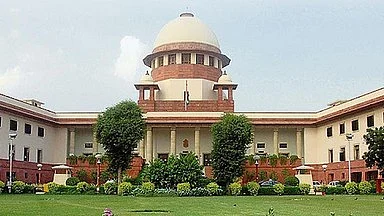SC hints at decriminalising defamation while hearing The Wire plea
Court’s latest remarks fit into broader pattern of judicial unease with continued use of criminal defamation

The Supreme Court on Monday remarked that “the time has come to decriminalise” defamation, while agreeing to examine a petition filed by the Foundation for Independent Journalism (FIJ) seeking to quash criminal proceedings against it. The plea arose from summons issued in a case filed by former Jawaharlal Nehru University (JNU) professor Amita Singh over an allegedly defamatory dossier published by The Wire.
A bench comprising Justices M.M. Sundresh and Satish Chandra Sharma issued notice to Singh after hearing preliminary arguments. During the proceedings, Justice Sundresh made an oral observation: “I think time has come to decriminalise all this…”
The petition was moved by FIJ, which runs the news portal The Wire, and its political affairs editor, Ajoy Ashirwad Mahaprashasta. The complainant has alleged that the accused deliberately ran a campaign to malign her reputation, and argued before the trial court that the material published was part of a targeted attack.
This is not the first round of litigation in the case. In 2023, the Delhi High Court had quashed the summons issued against the journalists. The Supreme Court, however, reversed that decision and remanded the matter to the trial court, which subsequently reissued the summons. The Delhi High Court upheld the second summons, prompting the present challenge before the apex Court.
The Court’s latest remarks fit into a broader pattern of judicial unease with the continued use of criminal defamation. In September 2024, while staying proceedings in another high-profile case against journalists, the Supreme Court had observed that criminal defamation provisions are increasingly being misused to stifle free speech and reporting. Similarly, in 2022, the Court emphasised that while reputation deserves protection, it must be balanced carefully against the Constitutional guarantee of free expression under Article 19(1)(a).
These observations come against the backdrop of the landmark Subramanian Swamy v Union of India (2016) judgment, where the Supreme Court upheld the constitutionality of Sections 499 and 500 of the Indian Penal Code (IPC).
At the time, the bench had reasoned that the right to reputation is integral to Article 21 (right to life) and therefore a “reasonable restriction” on free speech. Any move towards decriminalisation would thus mark a significant shift away from that precedent.
At present, defamation in India is both a civil and criminal wrong.
Section 499 of the IPC defines defamation, while Section 500 prescribes punishment of up to two years’ imprisonment, or fine, or both
Civil law, meanwhile, allows affected parties to sue for damages and seek injunctive relief
Critics have long argued that the criminal route creates a “chilling effect” on journalists, activists, and political opponents, since the mere threat of prosecution or arrest can suppress investigative reporting. Proponents counter that criminal penalties act as a necessary deterrent against malicious attacks and protect reputations in a society where civil litigation is often slow and costly.
The Court’s present intervention has opened up three possible trajectories:
Legislative reform, where Parliament might be nudged to repeal or amend Sections 499–500 IPC
Judicial reinterpretation, where the Supreme Court could narrow the scope of criminal defamation through precedent
Procedural safeguards, tightening thresholds for courts to take cognisance of complaints, thereby reducing frivolous prosecutions without scrapping the law
Whichever path is chosen, if any at all, the implications will be profound for India’s press, political discourse, and digital speech. The oral observation — “I think time has come to decriminalise all this” — may not yet be binding, but it signals that the judiciary is prepared to revisit the uneasy balance it struck in 2016 between reputation and free expression.
With PTI inputs
Follow us on: Facebook, Twitter, Google News, Instagram
Join our official telegram channel (@nationalherald) and stay updated with the latest headlines
